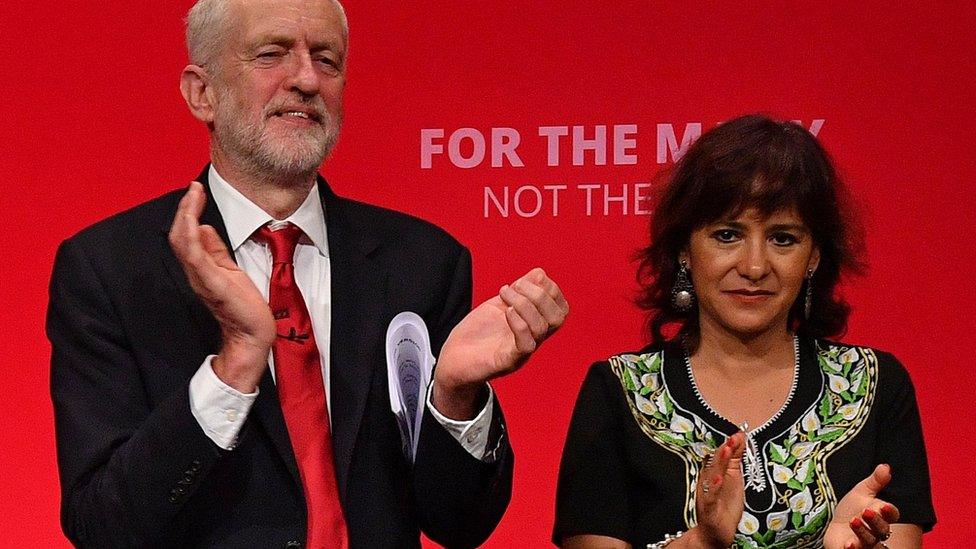Labour leadership: Jeremy Corbyn's wife says he was 'vilified'
- Published

Laura Alvarez joins her husband on stage at last year's Labour conference
Jeremy Corbyn's wife has accused the media of having "vilified" the Labour leader and said he was "attacked by his own party" during his time in charge.
In a rare public intervention, Laura Alvarez also the NHS would have been better prepared for coronavirus if Mr Corbyn had been PM.
Mr Corbyn is standing down after nearly five years as Labour leader, with his successor being unveiled on Saturday.
He told supporters it had been the "honour of my life" to lead the party.
In an e-mail to members and activists, he said he was sorry he had failed to return the party to power but suggested Labour, under his leadership, had "changed the agenda on austerity and how the economy is run".
Ms Alvarez, a Mexican human rights lawyer who has been married to Mr Corbyn for seven years, has largely steered clear of making public comments since he was elected Labour leader in 2015.
'Brutal irony'
But in her Mirror article, she said: "It has been incredibly hard for me to watch my husband vilified and to hear his words twisted by his political opponents and some in the media.
"It has been even harder to watch him be attacked by his own party.
"The brutal irony is that if we had pulled together, we would have been ready to lead the country rather than suffer more austerity under the Tories."
Lisa Nandy, Sir Keir Starmer and Rebecca Long-Bailey are in the running
Ms Alvarez said she was "proud" of her spouse and urged his successor "not to lose sight" of the left-wing policies promoted by him.
And she argued that the NHS would have been better prepared for the coronavirus pandemic if Mr Corbyn had been prime minister.
'Change in direction'
Mr Corbyn's successor will be announced on Saturday, along with a new deputy leader. Shadow chancellor John McDonnell said he expected the new leader to be Sir Keir Starmer.
Mr McDonnell, who is also standing down, backed Sir Keir's rival Rebecca Long-Bailey for the leadership.
But he told Sky News he hoped Sir Keir would appoint Ms Long-Bailey and fellow leadership contender Lisa Nandy to his team, and said Labour was now an "incredibly united party".
In his farewell message to the party, Mr Corbyn said he believed his successor could win power but only if they continued the fight for "social justice, equality and care for the environment".
Addressing his own future, he added: "I can assure you my voice will not be stilled. I'll be out there campaigning for socialism, peace and justice, and I feel sure we'll be doing that together."
A special conference planed to announce the results has been cancelled due to the coronavirus outbreak. Instead, the three candidates have been asked to record victory speech videos ahead of time.
Lisa Nandy said the three month contest had signalled a "change in direction" to a more united party after a number of divisive years.
The Wigan MP focused her campaign on winning back voters in what were traditional Labour areas in the North and Midlands ahead of the last election - known as the party's "red wall".
She told 大象传媒 Radio 4's Today programme both her competitors would be able to secure those votes as leader if they had "the will to do it" and made it a "top priority".
Ms Nandy said all the candidates had "focused relentlessly on the public" and "left behind the Leave/Remain divisions, [bringing] together MPs from across the party".
Shadow education secretary Angela Rayner is seen as the front runner in the deputy leadership contest.
She is competing against shadow equalities minister Dawn Butler, Scotland's only remaining Labour MP Ian Murray, Tooting MP Rosena Allin-Khan and shadow justice secretary Richard Burgon.
The winner will succeed Tom Watson, who stepped down in December.